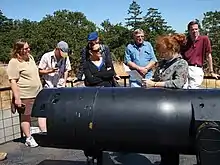International Committee for the History of Technology
The International Committee for the History of Technology (ICOHTEC) is an UNESCO-based non-profit-organization of scholars working on the history of technology. It was founded in Paris in 1968, when the Cold War divided the nations in the Eastern and Western worlds. At that time, ICOHTEC provided a forum for scholars of the history of technology from both sides of the iron curtain. It was constituted as a Scientific Section within the Division of History of Science and Technology of the International Union of History and Philosophy of Science and Technology (IUHPST/DHST). The first President was Eugeniusz Olszewski (Poland), with Vice-Presidents S. V. Schuchardine (Soviet Union) and Melvin Kranzberg (USA), whose role in the foundation of ICOHTEC deserves a special mention.[1] The first Secretary-General was Maurice Daumas (France); following his initiative the French government hosted the first independent ICOHTEC symposium at Pont-a-Mousson (1970).[2]

For the past several decades, ICOHTEC's principal activity has been an annual meeting,[3] where scholars from many countries and from many disciplines gather and share their work. Papers presented at the meetings are usually published in the Committee's annual journal ICON.[4] Nowadays, these symposias are attended by 150–400 participants. They usually take place in Europe, but ICOHTEC has visited nearly all continents. ICOHTECians met in Mexico City in 2001; in Beijing in 2005; in Victoria, British Columbia, in 2009; in Tel Aviv in 2015; and in Rio de Janeiro in 2017. Due to the COVID-19 pandemic, ICOHTEC organized one of the first digital conferences in the humanities: “ICOHTEC digital 2020.” The conference was hosted by Eindhoven University of Technology in the Netherlands. ICOHTEC participates in the International Congress for the History of Science and Technology, ICHST, every four years.

Since its beginning, the society’s aim has been to bring together scholars from different countries, providing a forum for discussing their approaches and promoting new approaches in the history of technology. These are presented at ICOHTEC symposia and developed in thematic sections. One of the early topics of ICOHTEC symposia was “Science–Technology Relationships”.[5] Whereas many historians conducted research on successful innovations, “Failed Innovations” has become a topic of ICOHTEC symposia already in the late 1980s.[6]
“Technology and Music” and “Sound Studies” have been important topics of discussion since the mid-1990s and approaches to “Creativity in Engineering, Music and the Arts” followed in the 2000s.[7] Sessions on the development of gunpowder and the “Social History of Military Technology” opened new perspectives on military history.[8] “Energy, Technology and the Environment” has become a long-time subject, focused on different aspects of the field, which have been important for contemporary research.[9] The cultural influence of “Playing with Technology” was analyzed in several sessions since 2009.[10] “History of Technology for an Age of Crises” was the general theme of ICOHTEC’s first digital conference in 2020.[11] It motivated many scholars. Beside contributions to the general theme, sessions on the “Technology of the Body” and on “Robots and AI” offered new perspectives.[12]
Discussion between Eastern and Western scholars dominated the first decades of ICOHTEC. The society’s main task today is to stimulate and support research in the history of technology on different continents. Results of ICOHTEC symposia have been published in proceedings of many meetings. Annual reports, published in the journal Technology and Culture, inform about past symposia as well.[13] ICOHTEC’s peer-reviewed journal ICON was founded in 1995. It currently publishes two volumes a year. The journal includes the best papers of the symposia and other important articles on the history of technology and its methodology. Besides organizing symposia and publishing ICON, ICOHTEC promotes scholarship at early career stages. The organization awards prizes for outstanding books and articles of early career scholars in the history of technology: the Turriano ICOHTEC Prize for books or PhD theses and the Maurice Daumas Prize for articles. Summer Schools for PhD students have been organized since 2016. They focus on methodological approaches in the history of technology, linked to the main themes of the symposia.
ICOHTEC’s peer-reviewed journal ICON was founded in 1995. It currently publishes two volumes a year. The journal includes the best papers of the symposia and other important articles on the history of technology and its methodology. Besides organizing symposia and publishing ICON, ICOHTEC promotes scholarship at early career stages. The organization awards prizes for outstanding books and articles of early career scholars in the history of technology: the Turriano ICOHTEC Prize for books or PhD theses and the Maurice Daumas Prize for articles. Summer Schools for PhD students have been organized since 2016. They focus on methodological approaches in the history of technology, linked to the main themes of the symposia.[14]
See also
References
- Post, Robert C.: Our Mel Kranzberg: Risks he took, stumbles, and sometimes a second thought, in: ICON. Journal of the International Committee for the History of Technology, Symposia Anniversary Edition, vol. 20/1 (2014), 6-16.
- See the homepage of the International Committee for the History of Technology, ICOHTEC, www.icohtec.org
- "ICOHTEC : 38th annual meeting (2011)".
- "International Committee for the History of Technology". Archived from the original on 2008-07-26. Retrieved 2008-08-09.
- Herlea, Alexandre, “Science–Technology Relationships in the Work of ICOHTEC,” Symposia Anniversary Edition, ICON 20, no. 1 (2014): 84-98.
- Braun, Hans-Joachim (ed.): “Symposium on ‘Failed Innovations,’” Social Studies of Science 22 (1992); Bauer, Reinhold: “Failed Innovations – Five Decades of Failure?,” Symposia Anniversary Edition, ICON 20, no. 1 (2014): 33-40.
- Braun, Hans-Joachim (ed.): Music and Technology in the 20th Century, Baltimore u. London 2002. Pinch, Trevor and Bijsterveld, Karin (ed.): The Oxford Handbook of Sound Studies. Oxford 2011. Braun, Hans-Joachim and Schmidt Horning, Susan (ed.): Creativity: Technology and Music. Frankfurt/Main u. New York 2016.
- Buchanan, Brenda J. (ed.): Gunpowder, Explosives and the State. A Technological History. Aldershot 2006. Vulcan. The Journal of the History of Military Technology, published since 2013.
- Williams, James C.: Energy, Technology and the Environment, in: Symposia Anniversary Edition, ICON 20, no. 1 (2014): 113-122.
- Braun, Hans Joachim and Poser, Stefan (guest ed.): Playing with Technology: Sports and Leisure. Special Issue, ICON, vol. 19 (2013). An overview of ICOHTEC subjects is given in the volume ICON 20.1 (2014), Anniversary Edition of ICON, see http://www.icohtec.org/icon/volume-20-1-2014/.
- Call for Papers of the 47th Symposium of ICOHTEC in Eindhoven 2020, http://www.icohtec.org/w-annual-meeting/eindhoven-2020/call-for-papers/.
- Special issues on these subjects are in preparation: Drucker, Donna (guest-editor): The Body and Technology; Poser, Stefan (guest-editor): Robots and Artificial Intelligence. In: ICON 26 no. 2 (2021).
- A list of past meetings and reports or proceedings is available on http://www.icohtec.org/w-annual-meeting/past-meetings/.
- See the homepage of the International Committee for the History of Technology, ICOHTEC, www.icohtec.org